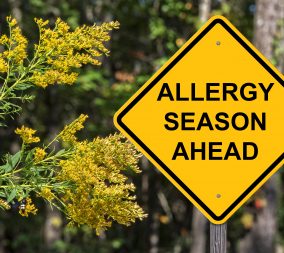Originally published in March 2015
Allergy season is upon us, which means pollen is coloring – and covering – everything in its path bright yellow! If you are pregnant this time of year, you may have noticed an increase in your symptoms whether you’ve previously suffered from allergies or not.
Often times pregnancy will cause a flare in your allergies, and what used to be just a mild annoyance is now a full-on attack of your eyes, nose, and throat. Symptoms can be mild, from a slight sniffle to severe, encompassing allergic conjunctivitis (significant irritation of the eyes), congestion and cough, and/or an extremely itchy nose and throat. About 50 million people in the US suffer from seasonal allergies or “hay fever,” but the good news is, even when pregnant, there are things you can do to help alleviate some of your symptoms. And the even better news is, your growing baby is completely insulated against the irritating effects of the pollen and all the other allergens in the air this time of year.
For mild symptoms such as a runny or itchy nose, you can start using saline nasal spray daily, and this is safe to use as often as you need it. The saline helps keep your nasal passages moist and reduces the amount of pollen that you’re actually inhaling. If you’re brave enough – using a Neti pot can be a great way to significantly reduce your allergy symptoms, sometimes as well as, or even better than, medication can. Typically, to use a Neti pot, you would mix about 16 ounces of lukewarm water (distilled, sterile, or previously boiled) with 1 teaspoon of salt. Some people add 1/2 teaspoon of baking soda to buffer the solution and make it gentler on the nose, but there isn’t any real proof that this improves the experience. Be sure to use distilled, sterile, or previously boiled water to make up the irrigation. Once you’ve filled the Neti pot, tilt your head over the sink at about a 45-degree angle. Place the spout into your top nostril, and gently pour the saline solution into that nostril. The fluid will flow through your nasal cavity and out the other nostril. Blow your nose gently to get rid of any remaining liquid, then refill the Neti pot and repeat the process on the other side. This method has worked since ancient Egyptian times, and Ear, Nose, and Throat specialists often recommend it to their sinus and allergy patients.
If the saline remedies aren’t enough, there are several options ranging from over-the-counter to prescription medications that have been used for many years in pregnant women and found to be safe during pregnancy. For OTC remedies, we generally recommend trying Claritin or Zyrtec daily. It can take a few days for maximum relief to be reached, but you should feel some improvement quickly with the first few doses. Zyrtec can make some people feel drowsy, so take it at bedtime. Claritin can be taken at any time of day. Zyzal, which is the second-generation version of Zyrtec, can also be used, but it is a prescription-only medication. For moderate to severe symptoms, the first-line of treatment recommended is generally an inhaled nasal steroid spray like Rhinocort or Nasalcrom. Both of these prescription sprays are Category B, and since little to none of the medication actually crosses the placenta, they are considered safe in pregnancy. Sometimes you may need both a nasal spray and an oral medication.
Finally, some of the simplest ways to reduce your exposure are environmental, such as limiting your time outdoors on days with high pollen counts and keeping your house and car windows closed to keep pollen out. It feels natural to want to open up all the windows and doors after the dreary winter we’ve had, but if you’ve done it before during pollen season, you know all too well the same pollen dust that covers our cars will quickly cover your lamps, rugs, and tables inside your home! It’s also a good idea to use an air conditioner, which filters the outside air before it enters your home. Don’t mow your lawn or rake leaves (yippee!), because this stirs up pollens and molds. Wash your hair after you’ve been outdoors, and don’t hang sheets or clothes outside to dry if you can help it.
You can always discuss your allergy concerns during any of your visits, and if you’re already taking an OTC allergy medication that was working before you were pregnant, you likely won’t have to stop taking it during your pregnancy. Just be sure to ask about the medications you are taking when you make your appointment or when we see you for the first time! The good news is the brief, but intense pollen season we experience here in Raleigh is usually limited to just a few short weeks, typically ending by the middle to end of May. Just in time for the heat and humidity of summer!
Written by Erin Wright, WHNP


















